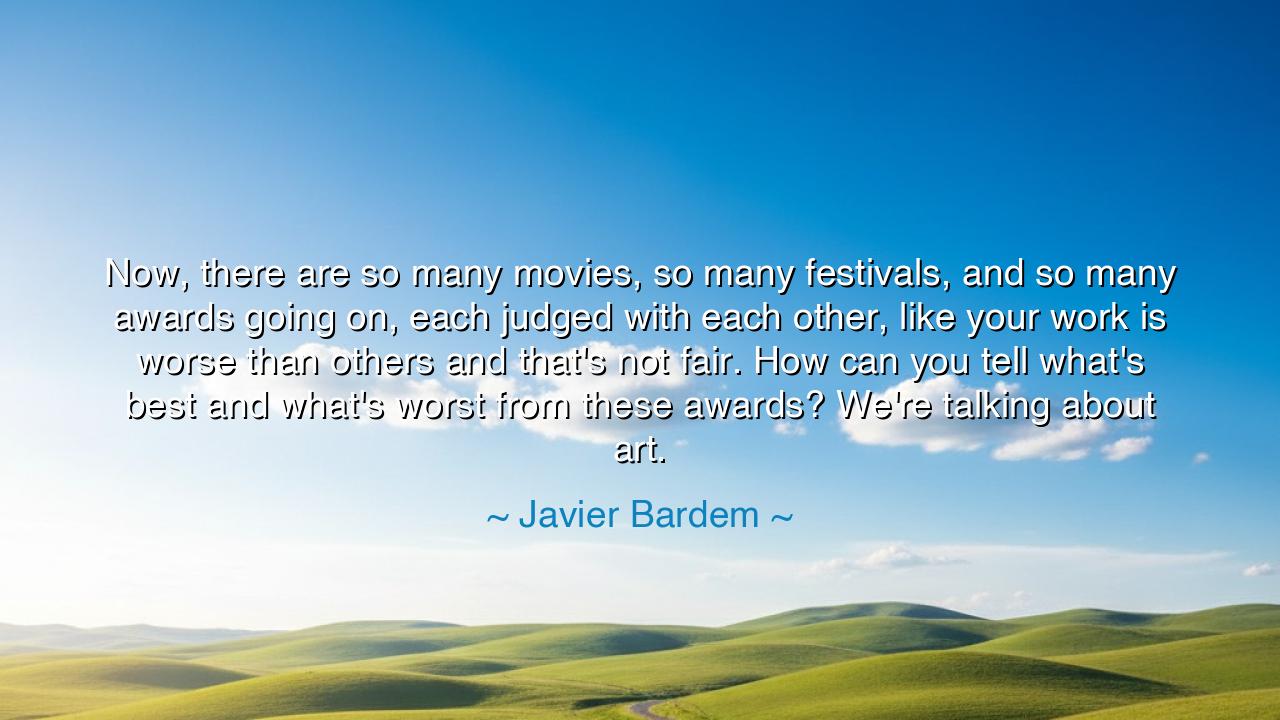
Now, there are so many movies, so many festivals, and so many
Now, there are so many movies, so many festivals, and so many awards going on, each judged with each other, like your work is worse than others and that's not fair. How can you tell what's best and what's worst from these awards? We're talking about art.






Ah, the words of Javier Bardem, whose reflection on the nature of awards, competition, and art reveals a deeper truth about the subjectivity of creativity and the limitations of judging artistic expression. When he says, "Now, there are so many movies, so many festivals, and so many awards going on, each judged with each other, like your work is worse than others and that's not fair. How can you tell what's best and what's worst from these awards? We're talking about art," Bardem speaks to the complexity of measuring something as inherently subjective as art. In his words, we hear the tension between objective standards and the personal experience of creation, and the unfairness of trying to rank or compare works that are deeply personal and different in their nature.
In the ancient world, the philosophers and artists did not measure greatness in the same way that we do today, for they understood that true art cannot be easily ranked or evaluated by simple standards. Plato, in his writings, famously discussed the idea of beauty and how it cannot be defined by a single formula. For him, beauty was not merely something to be judged by outward appearance, but something that resonated deeply with the soul, transcending any material measure. Similarly, Aristotle in his Poetics explored the nature of tragedy and drama, but he did not create a rigid system to measure the worth of each play; instead, he suggested that the emotional impact and moral lessons carried by a work were the true measures of its greatness.
Consider the great sculptor Phidias, who crafted the statues of the gods that adorned the Parthenon. In his time, there were no formal awards to judge his work. His statues were not simply admired for their craftsmanship, but revered for their embodiment of the divine and the eternal. The worth of Phidias’s work lay not in comparative competition, but in the way it spoke to the viewer’s soul. Similarly, the tragic poets of Greece, such as Aeschylus and Sophocles, wrote plays that were performed at festivals, but the true value of their work was in the emotional catharsis they created in the audience, not in the award they received. The ancient artists knew that the worth of a work lies beyond the judgment of others—it lies in its ability to resonate with the heart, to stir something deep within.
Bardem’s words echo this ancient wisdom, reminding us that the act of creating art is far more profound than any award or recognition could ever capture. Art is not a contest; it is a sacred expression of the self and the soul. Judging one work of art against another assumes that they are of the same essence, that they share the same purpose, which is a fallacy. Just as each ancient hero was unique in their virtues and flaws, so too is every work of art a singular expression of the creator’s vision. To compare them as though they are interchangeable is to ignore the deeply personal nature of creation.
Think of Michelangelo’s Sistine Chapel, a masterpiece that transcends any comparison. It was not painted to win a competition or to claim an award—it was created to serve a higher purpose, to connect humanity with the divine. Michelangelo’s genius could not be reduced to a simple ranking. His work was beyond comparison, as it spoke to the essence of what it meant to be human, to reach toward the divine, to express something ineffable. In the same way, Bardem’s insight calls us to recognize that art cannot be confined to a competition. Its value lies not in how it is compared to others, but in how it touches the soul.
The lesson in Bardem’s words is clear: art is not a contest. The purpose of creation is not to win an award or to be compared to others, but to express something true, something meaningful. When we engage in creation—whether as artists, thinkers, or creators—we must resist the urge to see our work as something to be ranked or judged by others. The true worth of our creations lies not in the awards or acclaim they receive, but in how they resonate with others and with ourselves. Bardem reminds us that art is about authenticity, not competition. The most powerful creations are those that speak to the heart and are true to the creator’s vision, not those that are designed to win recognition.
Thus, the call to action is clear: create with intention, not for recognition. Let go of the need for comparison and embrace the uniqueness of your own creative journey. Like Bardem, recognize that art cannot be measured by the standards set by others, but by the impact it has on the soul. Whether you are an artist, a thinker, or a creator of any kind, value the process of creation itself, and let your work speak for itself. Understand that, in the end, the worth of your creations is not determined by the awards they win, but by the truth they express and the connection they foster in the world.






AAdministratorAdministrator
Welcome, honored guests. Please leave a comment, we will respond soon